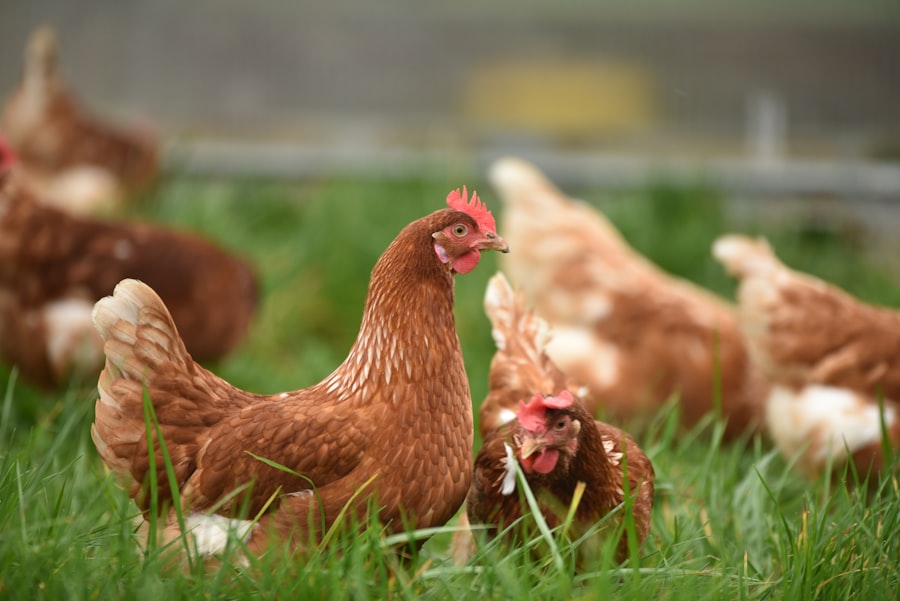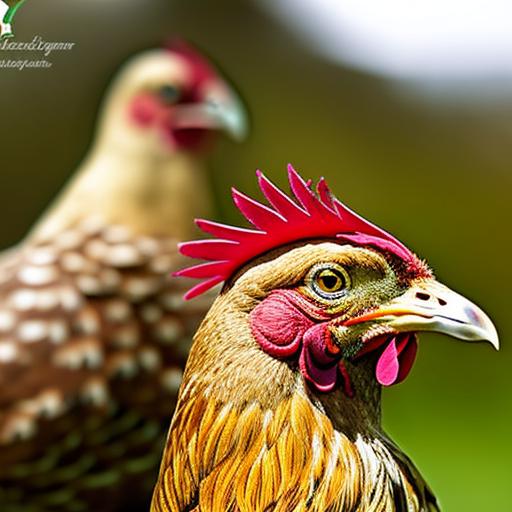Backyard chickens have become increasingly popular in recent years, as more and more people are looking for ways to become self-sufficient and connect with their food sources. Raising chickens in your own backyard can provide fresh eggs, natural pest control, and a rewarding hobby. However, before diving into the world of backyard chickens, it is important to understand the local laws and regulations that govern their keeping. This article will explore the various aspects of backyard chicken ownership, including permits and licenses, zoning laws, health and safety considerations, housing requirements, feeding guidelines, waste management, noise and odor concerns, potential legal issues, and available resources and support.
Key Takeaways
- Understanding local laws and regulations is crucial before keeping backyard chickens.
- Permits and licenses may be required to keep chickens in your garden.
- Zoning laws and property size requirements may limit the number of chickens you can keep.
- Health and safety considerations include disease prevention and predator protection.
- Housing and shelter requirements should provide adequate space and protection from the elements.
- Feeding and nutrition guidelines should include a balanced diet and access to clean water.
- Waste management and clean-up are important for maintaining a healthy environment.
- Noise and odor concerns should be addressed to avoid conflicts with neighbors.
- Potential legal issues with neighbors and community associations should be considered before keeping chickens.
- Resources and support are available for backyard chicken owners through local organizations and online communities.
Understanding Local Laws and Regulations Regarding Backyard Chickens
Before starting a backyard chicken flock, it is crucial to research and understand the local laws and regulations regarding their keeping. These laws can vary greatly from one area to another, so what may be allowed in one neighborhood may not be permitted in another. Some cities have strict regulations that prohibit backyard chickens altogether, while others have specific guidelines that must be followed.
For example, in some areas, there may be restrictions on the number of chickens you can keep or the type of coop you can have. There may also be setback requirements that dictate how far your coop must be from neighboring properties or public areas. Additionally, some areas may require permits or licenses to keep chickens in your backyard.
It is important to comply with these laws and regulations to avoid legal issues. Failure to do so can result in fines or even having to get rid of your chickens. By understanding and following the local laws, you can ensure a smooth and legal experience with your backyard chickens.
Permits and Licenses Required for Keeping Chickens in Your Garden
In some areas, permits or licenses may be required to keep chickens in your garden. These permits are typically obtained through the local government or animal control department. The purpose of these permits is to ensure that the chickens are being kept in a safe and responsible manner.
To obtain a permit or license, you may need to provide information about the number of chickens you plan to keep, the size and location of your coop, and any other relevant details. There may also be a fee associated with obtaining the permit.
It is important to comply with these requirements and obtain the necessary permits or licenses. This not only ensures that you are following the law, but it also helps to protect the health and safety of your chickens and your community.
Zoning Laws and Property Size Requirements for Backyard Chickens
Zoning laws and property size requirements are another important aspect to consider when keeping backyard chickens. Zoning laws dictate how land can be used within a specific area, and they often include regulations regarding the keeping of livestock, including chickens.
Some areas may have specific zoning designations that allow for backyard chickens, while others may prohibit them altogether. Additionally, there may be property size requirements that dictate how much land you must have in order to keep chickens.
To determine if your property is suitable for keeping chickens, you will need to research the zoning laws in your area and determine if you meet any property size requirements. This information can typically be found on your local government’s website or by contacting the appropriate department.
Complying with zoning laws and property size requirements is essential to avoid legal issues and ensure a positive experience with your backyard chickens. It is important to respect the regulations put in place by your community and be mindful of how your chickens may impact your neighbors.
Health and Safety Considerations for Backyard Chickens
When keeping backyard chickens, it is important to prioritize their health and safety. Chickens can be susceptible to various diseases and parasites, so it is crucial to take preventative measures to keep them healthy.
One of the most important aspects of chicken health is providing them with a clean and safe living environment. This includes regularly cleaning their coop, providing proper ventilation, and ensuring they have access to fresh water and nutritious food. It is also important to protect them from predators by providing secure fencing and a predator-proof coop.
Regular health checks are also important to catch any potential issues early on. This includes monitoring their behavior, checking for signs of illness or injury, and providing appropriate veterinary care when needed.
By prioritizing the health and safety of your chickens, you can ensure that they live happy and healthy lives while also minimizing the risk of disease transmission to other animals or humans.
Housing and Shelter Requirements for Backyard Chickens

Providing suitable housing and shelter for your backyard chickens is essential for their well-being. Chickens need a safe and comfortable space to roost, lay eggs, and seek shelter from the elements.
When it comes to housing, there are several factors to consider. The size of the coop should be appropriate for the number of chickens you plan to keep, allowing each bird enough space to move around comfortably. The coop should also be well-ventilated to prevent the buildup of moisture and ammonia from chicken waste.
In addition to the coop, chickens also need access to an outdoor run where they can stretch their legs and engage in natural behaviors like scratching and pecking. The run should be securely fenced to protect them from predators.
When building or buying a coop, it is important to consider the materials used. The coop should be sturdy and predator-proof, with secure latches on doors and windows. It should also be easy to clean and maintain.
By providing a suitable housing and shelter for your backyard chickens, you can ensure that they are comfortable, safe, and happy.
Feeding and Nutrition Guidelines for Backyard Chickens
Proper feeding and nutrition are crucial for the health and well-being of your backyard chickens. Chickens require a balanced diet that includes a variety of nutrients to support their growth, egg production, and overall health.
A good quality chicken feed should be the foundation of their diet. There are different types of chicken feed available, including starter feed for young chicks, grower feed for adolescent chickens, and layer feed for hens that are laying eggs. It is important to choose a feed that is appropriate for the age and stage of your chickens.
In addition to chicken feed, chickens also benefit from having access to fresh fruits and vegetables, as well as occasional treats like mealworms or kitchen scraps. However, it is important to avoid feeding them anything that may be toxic or harmful to their health.
It is also important to provide your chickens with access to clean, fresh water at all times. Chickens can drink a surprising amount of water, especially during hot weather or when laying eggs.
By providing a balanced and nutritious diet for your backyard chickens, you can ensure that they have the energy and nutrients they need to thrive.
Waste Management and Clean-up for Backyard Chickens
Proper waste management and clean-up are important aspects of backyard chicken ownership. Chickens produce waste in the form of droppings, which can accumulate quickly if not managed properly.
Regularly cleaning the coop is essential to maintain a healthy living environment for your chickens. This includes removing soiled bedding, replacing it with fresh bedding, and scrubbing any surfaces that may have become soiled.
Chicken waste can be composted and used as fertilizer for your garden. However, it is important to compost it properly to ensure that any potential pathogens are killed off during the composting process. Avoid using chicken waste directly on edible plants or in areas where children or pets may come into contact with it.
In addition to cleaning the coop, it is also important to regularly clean and sanitize the waterers and feeders to prevent the buildup of bacteria or mold.
By properly managing waste and maintaining a clean coop, you can minimize the risk of disease transmission and odor problems associated with backyard chickens.
Noise and Odor Concerns for Backyard Chickens
Noise and odor concerns are common issues that can arise when keeping backyard chickens. Chickens can be noisy, especially when they are laying eggs or feeling threatened. Additionally, chicken waste can produce a strong odor if not managed properly.
To minimize noise concerns, it is important to choose chicken breeds that are known for being quieter. Some breeds are naturally more vocal than others, so doing your research and selecting the right breed for your situation can help to minimize noise issues.
To address odor concerns, proper waste management is key. Regularly cleaning the coop and managing chicken waste through composting can help to reduce odors. Additionally, providing proper ventilation in the coop can help to prevent the buildup of ammonia from chicken waste, which can contribute to unpleasant odors.
It is also important to be considerate of your neighbors and community when keeping backyard chickens. Communicate with your neighbors about your plans to keep chickens and address any concerns they may have. Being a responsible and respectful chicken owner can go a long way in maintaining positive relationships with those around you.
Potential Legal Issues with Neighbors and Community Associations
While keeping backyard chickens can be a rewarding experience, it is important to be aware of potential legal issues that may arise with neighbors or community associations. Some people may have concerns about noise, odors, or other aspects of chicken ownership that could lead to conflicts.
To avoid these issues, it is important to be proactive in addressing any concerns that may arise. This includes being considerate of your neighbors by minimizing noise and odors, as well as addressing any issues that may arise in a timely manner.
If conflicts do arise, it is important to approach them in a respectful and constructive manner. Open communication and a willingness to find solutions that work for everyone involved can help to resolve conflicts and maintain positive relationships.
By being a responsible and respectful backyard chicken owner, you can minimize the risk of legal issues and maintain a positive relationship with your neighbors and community.
Resources and Support for Backyard Chicken Owners
Fortunately, there are many resources and support available for backyard chicken owners. Online forums and social media groups provide a platform for connecting with other chicken owners, sharing experiences, and seeking advice.
Local agricultural extension offices or poultry associations may also offer resources and support for backyard chicken owners. These organizations can provide information on local laws and regulations, as well as tips and advice on raising chickens.
Additionally, there are many books, websites, and blogs dedicated to backyard chicken keeping. These resources can provide valuable information on all aspects of chicken ownership, from coop design to health care.
By connecting with other chicken owners and seeking out available resources and support, you can gain valuable knowledge and guidance to help you become a successful backyard chicken owner.
In conclusion, backyard chickens can be a rewarding and fulfilling addition to your garden. However, it is important to do your research and understand the local laws and regulations that govern their keeping. By obtaining the necessary permits or licenses, complying with zoning laws and property size requirements, prioritizing the health and safety of your chickens, providing suitable housing and shelter, following feeding and nutrition guidelines, managing waste properly, minimizing noise and odor concerns, avoiding potential legal issues with neighbors or community associations, and seeking out available resources and support, you can become a responsible and successful backyard chicken owner.
If you’re wondering about the legalities of keeping chickens in your garden, you may also be interested in learning about the different types of chicken coops available. Poultry Wizard offers a helpful article on A-Frame Chicken Coops, which provides valuable information on the benefits and features of this popular coop design. To find out more about how an A-Frame Chicken Coop can be a great option for your backyard flock, check out their article here.
FAQs
What are the legal requirements for keeping chickens in my garden?
The legal requirements for keeping chickens in your garden vary depending on your location. It is important to check with your local council or authority to find out about any regulations or bylaws that may apply.
How many chickens can I legally keep in my garden?
The number of chickens you can legally keep in your garden also varies depending on your location. Some areas may have restrictions on the number of chickens you can keep, while others may not have any limits. It is important to check with your local council or authority to find out about any regulations or bylaws that may apply.
Do I need a permit to keep chickens in my garden?
In some areas, you may need a permit to keep chickens in your garden. It is important to check with your local council or authority to find out about any regulations or bylaws that may apply.
What are the benefits of keeping chickens in my garden?
Keeping chickens in your garden can have many benefits, including a source of fresh eggs, natural pest control, and fertilizer for your garden. Chickens can also be great pets and provide entertainment and companionship.
What are the potential drawbacks of keeping chickens in my garden?
Some potential drawbacks of keeping chickens in your garden include noise, odor, and the potential for attracting predators. It is important to consider these factors before deciding to keep chickens in your garden.
What do I need to provide for my chickens?
To keep your chickens healthy and happy, you will need to provide them with a suitable coop or shelter, access to food and water, and a safe and secure outdoor area for them to roam and forage.
What should I feed my chickens?
Chickens require a balanced diet that includes a combination of grains, protein, and vitamins and minerals. You can purchase commercial chicken feed or create your own feed mix using ingredients such as corn, wheat, soybean meal, and calcium.
What should I do if my neighbors complain about my chickens?
If your neighbors complain about your chickens, it is important to address their concerns and try to find a solution that works for everyone. This may involve making changes to your chicken keeping practices or working with your neighbors to find a compromise. If necessary, you may need to involve your local council or authority to help resolve the issue.
Meet Walter, the feathered-friend fanatic of Florida! Nestled in the sunshine state, Walter struts through life with his feathered companions, clucking his way to happiness. With a coop that’s fancier than a five-star hotel, he’s the Don Juan of the chicken world. When he’s not teaching his hens to do the cha-cha, you’ll find him in a heated debate with his prized rooster, Sir Clucks-a-Lot. Walter’s poultry passion is no yolk; he’s the sunny-side-up guy you never knew you needed in your flock of friends!







